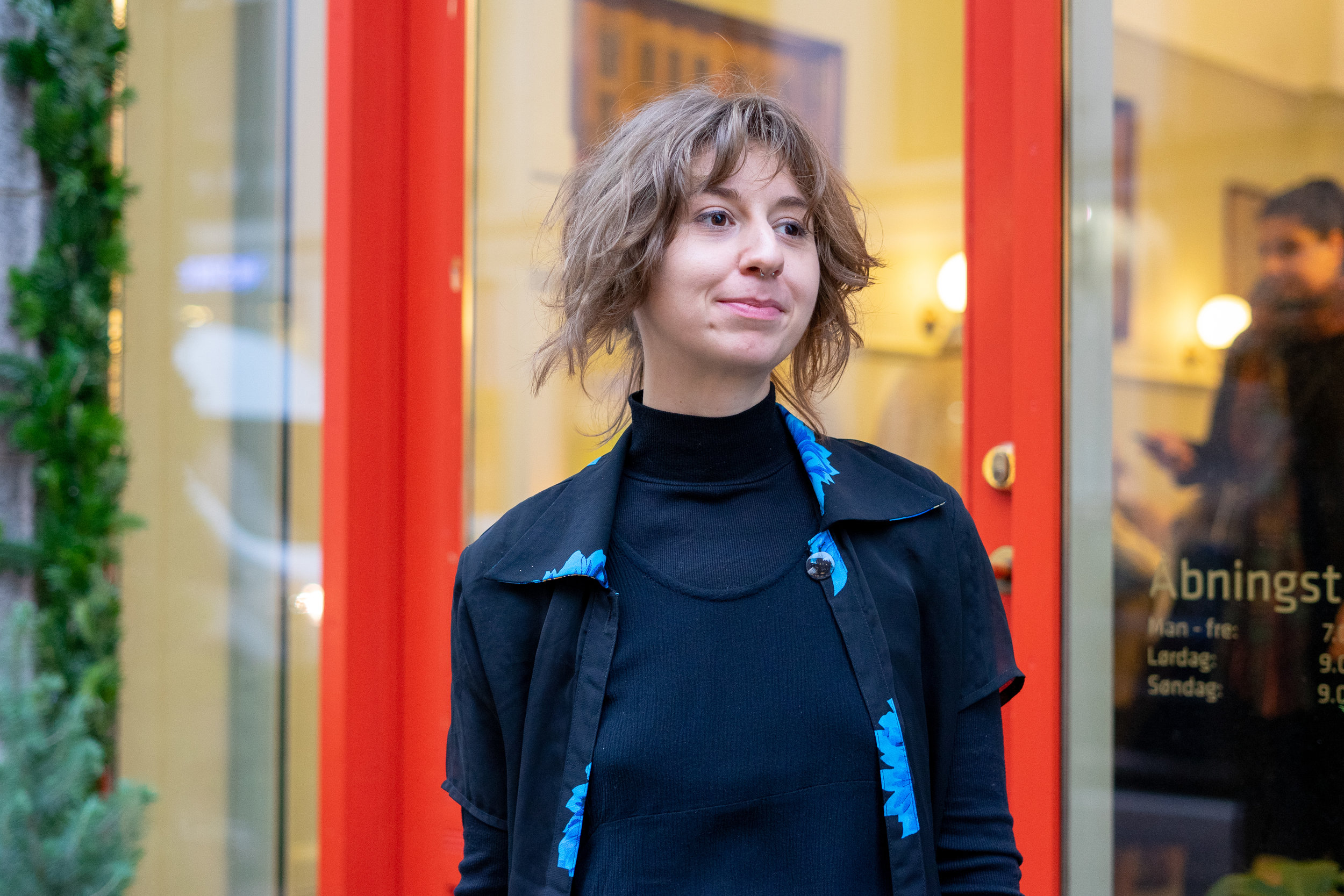Ashley Day, Sous Chef, The Coffee Collective

Photo by The Coffee Collective
Ashley Day, Sous Chef, The Coffee Collective
Company: The Coffee Collective
Location: Copenhagen, Denmark
Sector: Coffee Retailing, Management, and Customer Service
tLBCC: What does the company you are working for do—or can they do—to earn your trust?
Ashley Day: I am working as assistant bar manager at The Coffee Collective Bernikow in Copenhagen, Denmark. I think The Coffee Collective has successfully built trust with their employees and among their customers by creating clear values, having transparency in all facets of the company, with education, employee benefits, and in enabling social interactions.
I started as a part-time barista at The Coffee Collective about two and a half years ago when we were just around 30 people, including owners and office staff. Since then, we have grown to over 70 people and I have moved from part-time barista to Sous Chef. Needless to say, trust in a growth period is paramount and here are some of the things I think my company has done to maintain that trust—
Whether it is a speech at a company party, a development meeting, a workshop about origin travels, or a customer interaction, our biggest emphasis is the values of the company: “The dream that drives The Coffee Collective is to explore and unfold exceptional coffee experiences in a manner that gives better living conditions to coffee farmers across the globe.” Everyone in the company knows and feels this proclamation. What it means to work for The Coffee Collective is to know the names of the farmers or mill managers we work for, to know exactly how much we are paying them, to recognize a problem with how coffee is traded elsewhere, and to know why we trying to change that. The quality of our coffee goes up every year because we visit the farms/mills, because we pay at the very least 25% over fair trade price, because we build relationships with the same farms year in and year out, and because we provide stability in a volatile market for our partners at origin. They can focus on extra picking and sorting because they are not forced to pick the cherries when the market price is high, they are paid more money each year if the quality keeps increasing, and they feel proud of their work which makes them want to use the money by reinvesting in their farm (new equipment, better drying tables, etc). I believe when you teach your employees about the company’s core values and when they really know what it means to be apart of your company, then that in and of itself creates respect/trust amongst everyone.
Another way to build trust is through education so that your staff can speak confidently and feel up to date on company matters. Origin nights are hosted at the HQ by those who have been to the farms/mills we work with (which are bar managers and owners). Aside from the snacks and beers always to be expected, there is also open discussion about experiences at origin, the interaction with farmers, the processing methods, and the culture. All of this sharing of stories lets the baristas draw closer to that experience of their fellow colleague/s, which opens up the opportunity to relay some of that information to customers. When I am talking to a customer and say, “we just got back from the Kieni mill in Kenya last week”, that “we” is deep-rooted and sincere because of the shared trust I have among my colleagues and their experiences at origin. We also know all the farmer’s names, their faces–and in some cases have even met them in Copenhagen, like Pedro and Daniela Rodriguez of Finca Buena Vista in Bolivia. This was another one of our after-hour educational nights where we got to learn a bit more about the coffee we work with from the very people who grow, harvest, and process it.
It has also been built through self-growth discussions with bar managers but, more importantly, with our human resources director Mikaela Gervard. Everyone in the company has these discussions at 6 months and then once a year after that, and this is whether you are a manager, an office employee, or if you are working part-time while going to school. A company needs to create capital, of course, but what is truly important is creating a kind of social capital among all players contributing to the success of the company. Money is not everything and The Coffee Collective focuses on so much more than just cutting costs and trying to make the most money they can.
I want the company to succeed because I feel the mutual benefit that will be blanketed on my fellow baristas, managers, roasters, administration workers, owners, and especially the farmers we work so closely with. We also feel taken care of because we pay a small amount towards being apart of one of the best service industry unions, and have a private insurance which includes free physical therapy, massages, chiropractic visits, and psychiatry if we need to use it.
We have also created a barista education program filled with workshops that take place all throughout the year and focus on an array of topics. We’ve had one focusing on service (where one of the exercises was looking at the physical layout of the bar and discussing what facilitates good service and what hinders that service, for instance, an awkward placing of a water/lid/sugar station confusing the guest), and we’ve had another focusing just on espresso (where we got to make our own blend and talk about why we paired those specific coffees together!).
Once a year, we hold a management workshop and since I have been apart of the management team since March 2018, I was excited to attend my first one a couple of weeks ago! We wrote down ideas on how to create a better environment for our baristas to give good service and discussed the difficulties of being stressed out/busy as a leader. We also talked about what motivates people (and guess what? it’s not money). After that, we had an input period where all bar chefs and sous chefs from each location decided it would be great for sharing of ideas if we had shift leader do shifts at different bars! Normally, the management team sticks solely to their location but with a growing team of baristas, we thought it would benefit the creativity and problem-solving ideas of the managers if we had shifts once a month at different locations.
The company also creates social interactions among the employees themselves so that we truly know each other, have the same values, and feel like one collective family. We save our tips from each individual shop and think of staff activities or dinners to have. We are also encouraged to stay after a workshop and have free drinks and get to know our colleagues. Oh! and we have two big, surprise location parties a year (a summer and a Christmas party) at some of the best restaurants in Copenhagen, drink some of the best wine, and dance with all our coworkers until the sun comes up.
tLBCC: What steps do you take to actively build trust with the customers that come into the cafe you are managing? How do you ensure that you are providing a reliable experience for them?
Ashley Day: One of our biggest goals at The Coffee Collective is to give exceptional service. We are always told to say hello and welcome our customers. We ask them about their coffee experience, “intercept” them at the retail shelf, and to always do our best to say goodbye as they leave the cafe. This is to create interactions and make the customers feel wanted. We do not want our guests to feel that their presence is a difficult chore, but instead, a desired and pleasant part of the day.
First of all, I think it is important to have knowledge about the coffee you are serving and to speak with confidence when describing flavours or talking about the farm. It is also important to be able to read the customer and know if they are wanting a super coffee geek experience or a more limited pleasant experience. For the person who gets a Kenyan pour over to the person who gets your heaviest espresso as an americano with milk and sugar; both of these customers can feel they had a reliable experience if you handle the situation correctly. Having said that, it is also important to challenge customers and ask, “Are you wanting to try something funky and out of your comfort zone today? And if they are intrigued, and willing, and have the time then go for it! In the end, they might walk away with something they weren’t necessarily looking for, but can now appreciate the effort you took in challenging their habits. As long as you prepare the customer’s palette with open dialogue of tasting something different, then they will trust you.
tLBCC: Do you have any other thoughts about building trust along the coffee supply chain?
Ashley Day: I think the best way to build trust is to be as transparent as possible. Let as many people along the coffee supply chain know where their money is going, be open with the customers about your trading model, and try to let your employees know every bit of information that the CEO knows. When workers feel that mutual respect and responsibility for the success of everyone in the coffee supply chain, then the decisions made along the way can only be exceptional.
And, this isn’t to say that we at The Coffee Collective have everything figured out, because that will never be the case. We are continually trying to improve the way we source, serve, and maintain sustainability in the coffee world and there is always things that can be done better. But I do feel that we have trust amongst our colleagues because we feel valued in our work and have one collective and clear goal.

